Breakthrough of the Serbian defense. Storming belgrade
During September 1915, in order to mislead the Serbian command, the German artillery bombarded the Serbian coast of the Danube and Sava several times. On October 5-6, 1915, actual artillery preparation by the Mackensen armies began with the aim of preparing the crossing. October 7 Austro-German troops, with the support of the Danube flotillastarted the crossing. From Bosnia, the Austro-Hungarian forces attacked Montenegro, constraining its army so that it could not, like during the 1914 campaign, attack the flank of the Austro-German army.
The crossing of the Austro-German troops near Belgrade turned out to be long and full of obstacles, it was necessary to take a well-fortified and favorable for defense, in its natural position, bridgehead. The crossing was hampered by the need to clear the fairways of both rivers from minefields. In addition, a hurricane began, which lasted more than a week. He dispersed and damaged part of the ships and in some places cut off the landing vanguard from the main forces. However, the advanced units were so reinforced that they withstood the Serbian counterattacks without the support of the main forces. An important role in the success of the Austro-German wax was played by heavy artillery, which suppressed most of the Serbian artillery and destroyed the fortifications. A large role in the crossing was also played by the ships of the Danube Flotilla, which supported the landing troops and suppressed the Serbian batteries with fire. The Austro-German troops used searchlights, which helped to mine mines, dazzle the enemy's searchlights at night, illuminate targets for artillery, and covered troops with a light curtain.
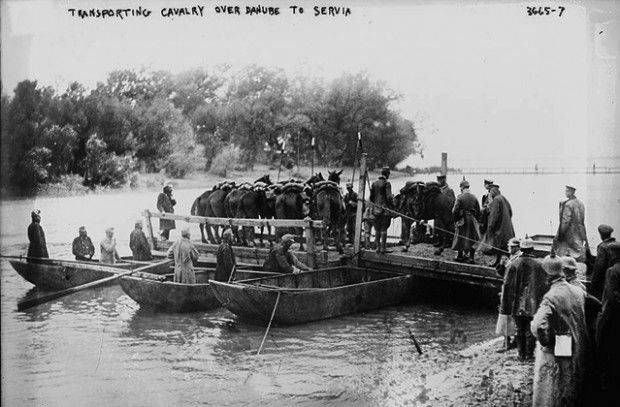
Transportation of troops across the Danube
The plan of operations envisaged the transition of the Austro-German across the Drina, Sava and Danube. At the same time, the 3 Army was supposed to cross its right flank, with a force of one and a half divisions, joined by the Bosnian Visegrad group, overcoming the knee formed by Drina and Sava in Machva, as well as forcing Sava with the help of steam ferries under the cover of monitors and armed ships Danube Flotilla. With its center (three divisions of the Austro-Hungarian 14 Corps), on the night of October 3, the 7 Army was to cross the Sava at Progara on ferries and along the military bridge under the guise of the Danube Flotilla ships. On October 7, the troops of the 14 Corps were to erect a pontoon bridge at Bolevtsy. On the left flank, the 26-I Austro-Hungarian division had to cross Sava at Ostruznica to divert the Serbs, and the 22 German reserve corps to force Sava above the Greater Gypsy Island to cover the south-west Serbian capital. German troops were to take part in the capture of Belgrade and to join the 8-m Austro-Hungarian Corps, advancing from Zemlin. An important role at the beginning of the operation was to be played by the Austro-Hungarian Danube Flotilla under the command of 1 captain, rank Karl Lutsich.
The German 11 army had to cross the Danube simultaneously in three columns: at Palanca and Bazias, the 10 reserve corps attacked Ram; at Dunadombo there is the 4 th reserve corps across the Danube island Temestsiget to Kostolaki, and from Kevevara the 3 th reserve corps towards the old Turkish fortress Semendria. Lower down the river near Orsov, the Austrian group of General Foulonn was to operate. Orsov group performed mainly demonstrative task. She had to misinform and forge the Serbian troops. Then she had to establish contact with the Bulgarians and, together with the 1 of the Bulgarian army, occupy the ledge of the Serbian territory in the Danube bend near Kladovo, in order to ensure free navigation on the Danube.
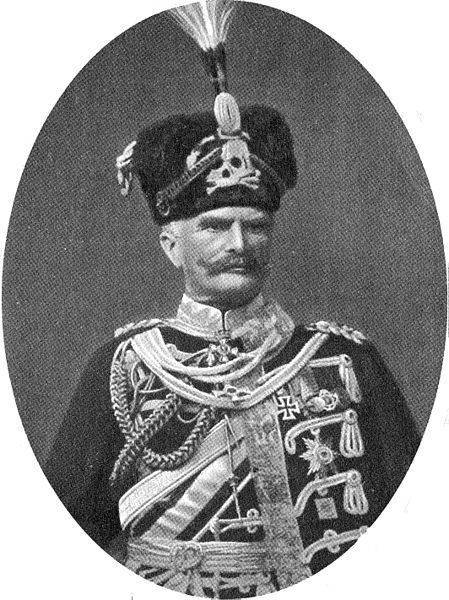
Field Marshal Augusta von Mackensen
The offensive 3 th Austro-Hungarian army. The army of Köwes spent five days on the crossing, as the Serbian army stubbornly defended its capital. Austro-German artillery conducted a powerful artillery preparation. So, at noon on October 6, the heavy artillery of the 8 of the Austro-Hungarian Corps began the preparation of a four-hour hurricane fire from 70 heavy and medium and 90 light guns. This was followed by shrapnel fire, in order to suppress attempts at restoring Serb batteries.
The Austrian corps 8 had to make the longest journey along the water, about 4 km, from the Zemlin region to Belgrade. His headquarters made a mistake in planning and the first echelon of the 59 Infantry Division, instead of the time assigned for the landing in 2 hour 50 minutes. walked to the Serbian coast in 4 hours. And the artillery preparation was completed according to plan exactly at 2 hour. 50 min. Therefore, the Austrian units had to land without the support of artillery. Because of this, and also because of strong Serb resistance, the crossing was difficult. In addition, the rising water in the rivers flooded the island at the mouth of the river. Sava and low-lying parts of the Danube coast, which worsened the landing conditions and did not allow the telegraph cable to be sent to the Serbian coast. The landed vanguard was left without communication and could not inform about the need for artillery support. This led to the fact that the advanced shock battalions suffered significant losses in men and materiel.
Only 9 of October came the steamboats and, following the troops of the 59 Infantry Division, transported the 57 Infantry Division, which allowed the Austro-German troops to finally take control of Belgrade. The strike groups of the Austro-Hungarian troops broke into the city and the fortress of Belgrade from the north, took the citadel and the Vrachar heights.
The 22 German Reserve Corps reached the Sava River in the evening on October 6. Serbian troops were on the heights of Banovo, which so rose above the opposite bank, that approaching the river in the afternoon along the low and strongly swampy left bank of the r. Sava was extremely difficult. Therefore, the troops began to force the river at night. Behind the small islands off the Austrian coast, the pontoons brought up by pioneers (sappers), 10-15 units per each regiment that was being forwarded, were hidden in advance. The landing of troops on the pontoons began after 2 hour. October 7 nights. Already after 15-20 min. the first trains have already landed on the Serbian coast and on the Gypsy island. They were followed by the rest of the troops. While the troops were crossing at night, the losses of the German troops were small, but at dawn, the Serbian artillery intensified and they greatly increased. Having lost up to two-thirds of the pontoons, the German troops were around 8 an hour. in the morning suspended the crossing.
The advance units (approximately one battalion per regiment) had to withstand Serbian counterattacks all day. The Germans and Austrians were saved by the fact that the main forces of the Serbian army had not yet managed to regroup from the Bulgarian direction. Only in the evening the crossing was resumed, but already with heavy losses than on the first day. On October 8, the right-flank 208 th reserve regiment occupied the first line of the Serbian position and went into the rear of the Serbs who defended the Gypsy island, which made them hastily retreat. As a result, the 207 Infantry Regiment was able to capture a serviceable Serbian bridge connecting the Gypsy island with the coast. This facilitated the crossing. Then the German troops launched an assault on the steep Banov Heights. A few hours later, thanks to the strong support of heavy artillery, German troops broke the resistance of the Serbs.
Due to this success 9 October 43-I German reserve division took the suburb of Belgrade - Topchidere. On the same day, after heavy street fighting, Austrian troops took Belgrade. Defending the city, about 5 thousand Serbs perished. Many residents of the capital and people from other places, remembering the excesses of the past Austro-Hungarian invasion, when they did not stand on ceremony with civilians, robbed, raped and killed, left their homes and joined the retreating army. The disaster began. The country collapsed before our eyes.
Thus, the Austro-German troops on the third day of the operation took the Serbian capital - Belgrade. However, the crossing at Belgrade was delayed and was carried out instead of one in three days. The incorrect calculation of the crossing of the Austro-German command could have turned the whole enterprise into failure if it were not for the stubbornness of the Germans who had broken the Serbs with great losses for themselves, as well as the weakness of the Serbian army in the Belgrade sector and the complete superiority of the Austro-German forces in heavy artillery.
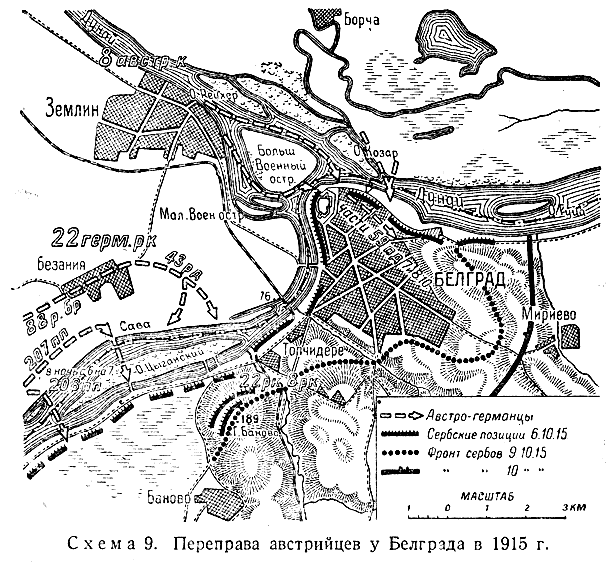
Source: Korsun N. Balkan Front of World War 1914-1918
The onset of the 11 of the German army. The crossing of the 11 of the German army was prepared in the spring and summer of 1915. The Austrian sappers carried out reconnaissance of the river, completed the strengthening of positions on its bank, fixed the roads and bridges. Intelligence revealed that the section from the mouth of the river is more convenient for crossing. Karas do Baziasa, which allowed the concealed concentration of troops and boats. The crossing was planned at once in four places: the mouth of the r. Karasa, Snake Island, estuary Nera and Bazias. It was planned to build a bridge using Snake Island.
All these places have been carefully studied and prepared for the crossing taking into account weather conditions, the state of the water level and the likely actions of the Serbian troops. The mouths of the Karas and Nera rivers were cleared of sediments and mines, and their fairway was submerged by subversive works so that boats and pontoons could pass there. In addition, the engineering services prepared a dense network of roads in the places of the initial location of the troops, put signs for the troops and set up observation posts. A special feature of the landing of troops in this area was a hurricane, which interrupted regular shipping for several days and interfered with sweeping operations.
Before the start of the operation, the Austrian sappers raised eight barges that had sunk beyond the Ponavica island, and a ship sailed by the Serbian artillery at Art. Moldavians. Barges with great effort raised and fixed, putting them off the coast of the island of Ponyavitsa under the guise of a forest and bushes. The steamer was also raised and transported to the island of Ponavitsa, covered with trees. In addition, the Germans at night moved around the 100 semi-pontoons, which were lowered along the r. Karasu to its mouth, and then on the river. The Danube to the Snake Island, where they were dragged to the shore and covered. The crossing was also provided by Austrian rowing ships, divisional and hull German bridge ferries.
The immediate goal of the German troops after the crossing was the capture of the area of Goritsy and the massif of Orlyak (south of Goritsy), and then the border of Klitschevan, Zatonie. The advanced troops carried with them ammunition for five days, food for six days and large stocks of engineering equipment. It was a very sensible decision, since the elements that were clearing up led to a break in the crossing.
Thus, the Austrians and the Germans carefully prepared for the crossing of the water barrier. Moreover, all these preparations were made so covertly that the October 7 ferry turned out to be unexpected for the Serbs.
6 October 1915 German artillery began shelling the Serbian positions and by the morning of October 7 the fire was brought to the degree of a hurricane. Despite the powerful fire of almost 40 batteries, which lasted until the landing of the forward echelon of the 10 Corps, advancing from Snake Island, the Serbs, after the Germans moved the artillery fire deep into Rama. By the evening of October 7, two regiments of the 103 Infantry Division were transferred.
Then the German troops had to go through difficult days. 8 and 9 October was pouring rain, which turned into a storm. Until October 17 lasted a hurricane. At this time, all the means of crossing, except the steamer, were inactive. A number of boats was damaged by hurricane wind. At the same time, the Serbs were firing artillery fire, and went on the counter, trying to throw the Germans into the river. The ship with great difficulty completed the transfer of troops 103-th division. Only additional stocks of ammunition, food and various equipment allowed the Germans to survive. The storm ended only on October 17 and the remaining troops of the 10 of the German corps were transferred to the other side. October 21 Germans put two bridges.
Thus, careful preparation of the operation allowed the 11 of the German army to successfully force the river, despite the 8-day hurricane. The Germans, with the help of powerful crossing means, without building a bridge, transferred such large and well-equipped units that they could repel all enemy counterattacks and hold out until the main forces approached.
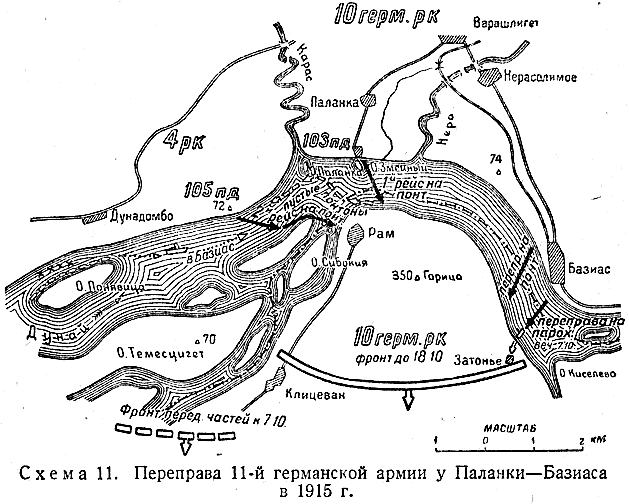
Further offensive Mackensen troops
The Serbian command began a regrouping of forces from the Bulgarian direction to the north with the aim of creating a strong defense on the way of the Austro-German troops. Austro-German troops, who lingered at the crossing more than planned, by October 18 were able to advance on the southern bank of the r. Danube only 10 km. The 19 th Austro-Hungarian corps, advancing on the Bosnian direction, overcoming the stubborn resistance of the Montenegrin army, also advanced slowly.
On October 21, the avant-gardes of Mackensen’s armies were on the Ripanj line, Caliste, and the Austro-Hungarian troops, who had crossed the Lower Drina, reached Shabac. The onset of the Austro-German troops went with great difficulty, especially due to the lack of communication lines. The available roads were spoiled by the autumn rains. The Austro-German troops were no longer delayed by the resistance of the Serbian troops, but by the dirt and the roads that were filled with people.
Especially difficult was the 3 th Austro-Hungarian army of Köwess, which is worse than the 11 th army, overcame the resistance of the Serbs. The German High Command offered the Austrians to strengthen the 3 Army at the expense of troops from the Italian Front. However, the Austrians were afraid of a new offensive by the Italian army and refused to the Germans. Indeed, the 18 of October began the third offensive of the Italian army (the third battle of the Isonzo). However, the Italians could not help Serbia. All the attacks of the Italian divisions crashed against the powerful defense of the Austrian army. The Austrians were ready for an enemy attack. Italians put a lot of soldiers, but advanced slightly. In November, the Italian army launched the fourth offensive against the Isonzo. Fierce fighting continued until December, all attempts by the Italian army were unsuccessful. For the breakthrough of strong Austrian defense, which took place in the highlands, the Italians had catastrophically little heavy artillery.
On the left flank of the Austro-German Army Group Mackensen, the situation was also difficult. The weak Austrian group of Fulonna, located at Orsov, failed to force the Danube at the beginning of the operation. As a result, the Austrians could not immediately provide the junction between the 11 of the German and 1 of the Bulgarian armies, and the transportation of various supplies and materials along the Danube to Bulgaria. And the Bulgarian army depended on supplies from Austria and Germany.
Only on October 23, the Austrians near the city of Orsov were able to organize powerful artillery preparation, with the participation of 420-mm guns. Hurricane artillery fire destroyed the Serbian fortifications. Under the cover of strong artillery and machine-gun fire (the width of the Danube at Orsov allowed effective machine-gun fire on the other bank), Austrian troops were able to force the river and gain a foothold. After the arrival of reinforcements, the Austrians continued the offensive and captured the necessary bridgehead. Thus, with the help of strong artillery and machine-gun fire, the Austro-Hungarian group of Fulonna was able to break the resistance of the Serbian forces and force the Danube.
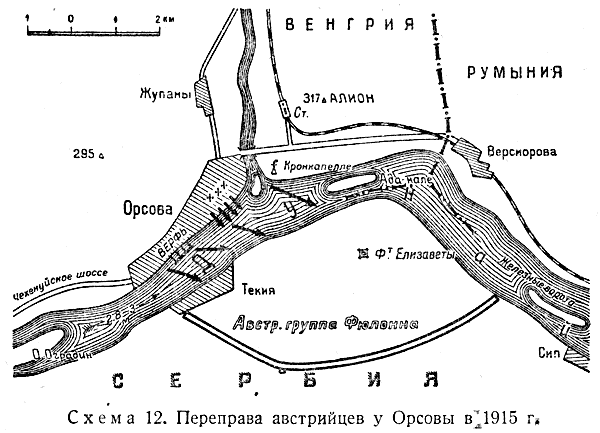
Bulgaria enters the war
October 15 Bulgarian troops crossed the border of Serbia. At first, the Bulgarian troops met with fierce resistance from the Serbs and advanced rather slowly. The Bulgarians for a long time unsuccessfully attacked the well-fortified positions of the Serbian army on the r. Timok and north of Pirot. But on the left flank, Bulgarian troops were able to raid the Vranja station, where they destroyed the railway and telegraph, cutting off Serbia’s connection with the Allied forces in Salonika.
By October 21, the Bulgarian Army 1 continued to storm the Serbian positions. The right wing and center of the Bulgarian army was on the river. Timok between Zaichar and Knyazhevatz, and the left wing fought at Pirot. Only October 25 Bulgarian troops forced the Serbs to withdraw for Timok. The 2-I Bulgarian army easily reached the area of Vranja and Kumanov, and with its left flank it intercepted the r. Vardar in the area of Veles. Thus, the Bulgarian troops broke the link of the Serbian army and the allied expeditionary corps in Salonika. This put the bulk of the Serbian army at risk.
To be continued ...
- Alexander Samsonov
- 1915 Campaign
Military plans of the Entente and the Central Powers for 1915 year
Death of the 20 Russian Corps
"Rubber War" in the Carpathians
Battle for Prasnysh
Italian "jackal" enters the war
Battle of the Isonzo
Second Battle of the Isonzo
Germany turns east
Bosphorus bait for Russia
Gorlitsky breakthrough
The defeat of the 3 Army Radko-Dmitriev. The death of the 48 "Steel" division of General Kornilov
Departure of Russian armies from Galicia. Loss of Przemysl and Lviv
The great retreat of the Russian army
The fall of Warsaw
Fall of the Newgeorg Fortress
The great retreat of the Russian army was the harbinger of the 1917 disaster of the year.
1915 Campaign of the Year on the Caucasus Front
Solution of the “Christian Question” in Turkey during the First World War
Battle for van
Alashkert operation
Hamadan operation
Sventsian breakthrough
Completion of the 1915 campaign of the year on the Russian front: the battle for Lutsk and Chartoryisk. Operation on the river. Strypa
As England and France set up Russia under the German ram
Dardanelles operation
Dardanelles: defeat at sea
Dardanelles trap
"It was the devil's feast ..." Sturm Gallipoli
Battle of Critia. New losses of the allied fleet
Landing operation in the gulf of Suvla
"Damned Dardanelles!" They will be our grave. ” Defeat of the allied army
Bulgarian "bros" enter the war
How to defeat Serbia
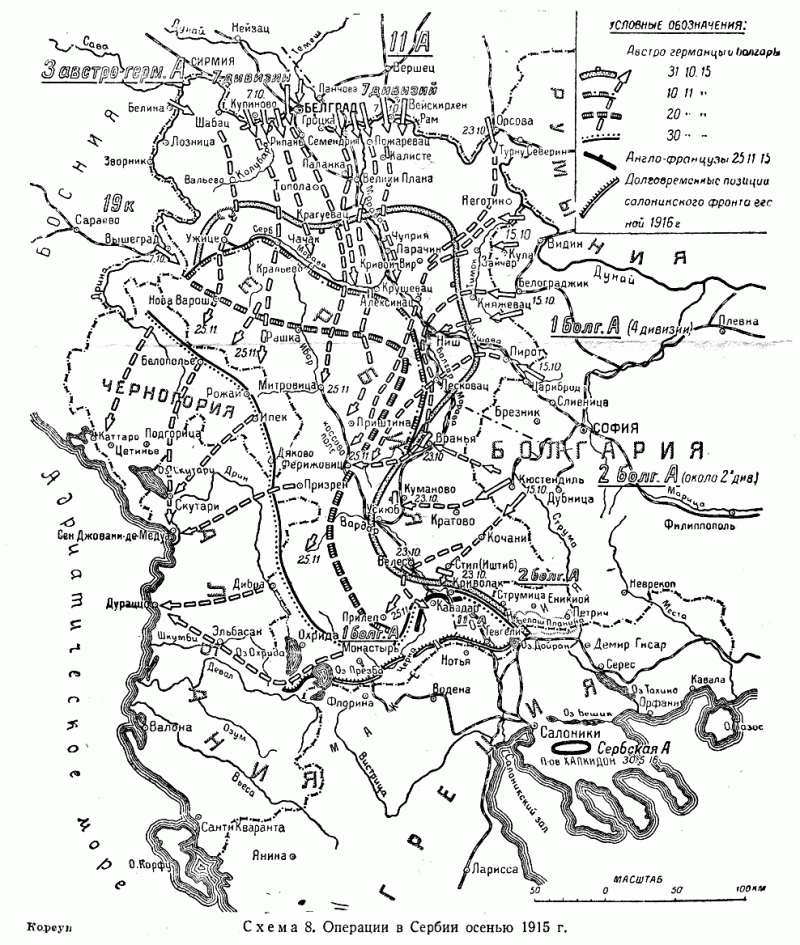
Information